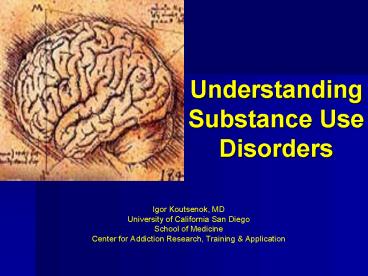Understanding Substance Use Disorders - PowerPoint PPT Presentation
1 / 32
Title:
Understanding Substance Use Disorders
Description:
Igor Koutsenok, MD University of California San Diego School of Medicine Center for Addiction Research, Training & Application Why study substance use disorders ? – PowerPoint PPT presentation
Number of Views:551
Avg rating:3.0/5.0
Title: Understanding Substance Use Disorders
1
Understanding Substance Use Disorders
- Igor Koutsenok, MD
- University of California San Diego
- School of Medicine
- Center for Addiction Research, Training
Application
2
Why study substance use disorders ?
- You will encounter it
- It could happen to you
- You need to know how to deal with it
- Help eliminate the negative prejudice and stigma
- Substance abuse addiction are treatable
- You can make a difference
3
S.P.A.M.
- Stigma
- Prejudice
- Anger
- Misunderstanding
- All of these lead to myths widely spread
inaccurate believes as compared to
research-generated facts
"Absinthe Drinker Pablo Picasso (1910)
4
(No Transcript)
5
- Why do we call certain chemicals psychoactive
substances?
6
(No Transcript)
7
Drug Categories
- Based on usual effects at usual doses
8
Drug Categories
- Depressants
- Stimulants
- Opiates
- Cannabinols
- Hallucinogens
- PCP
- Solvents
- Others
9
Effects of CNS depressants
10
Effects of CNS stimulants (amphetamines)
11
Effects of CNS stimulants
12
Caffeine addiction
13
Definitions
- Abuse - intentional overuse in cases of
celebration, anxiety, despair, self-medication or
ignorance. Tends to decline with consequences. - Dependence - impaired control over drug use,
caused by a dysfunction of the mesolymbic system,
or pleasure pathway. - Dependence Addiction
14
Addiction is
- A pattern of chronic, relapsing, compulsive
drug-taking behavior - Characterized by impaired control over drug use
15
Remember...
Addiction is a disorder no one chooses to
have It is marked by a resistance to give up
drugs
16
- Why only some people develop problems?
17
Common risk factors and vulnerabilities
- Alcoholism and drug addiction are primarily
psychological problems - Alcoholism and drug addiction are primarily
socio-environmental problems - Alcoholism and drug addiction are medical
problems diseases
18
Psychological Models
- Addictive Personality- ???
- Self Medication
- Personality Disorders (anti-social, OCD, etc..)
- Self Esteem Problems
- Excessive Risk Taking
- Low Tolerance for Tension
- Drugs Reduce Tension
- People Use it and Get this Response
Reinforcement
19
- Socio-Cultural Explanations
- Attitude Toward Drug Taking
- Availability
- Cultural Acceptance
20
Medical/Biological Explanation
- Genetic evidence
- -Adoption and twin studies
- -Tolerance in sons of alcoholics
- -Genes as protective factors
- -What gets genetically transferred?
- -Genetically determined vs.genetically influenced
21
(No Transcript)
22
Mesolymbic Dopamin System
- Ventral-tagmental area (VTA)
- Lateral hypothalamus (LH)
- Nucleus accumbens (NA)
- Fronto-orbital cortex (FOC)
- Extended Amigdala (EA)
23
Axon
???
storage
Reuptace
Neurotransmitter
Synaps
Receptors
Dendrite
G-proteine
Signal
24
Neurotransmitters most involved in dependence
- Dopamine (cocaine, alcohol)
- Serotonin (5-??) (amphetamines, alcohol)
- Endorphines (opiates, alcohol)
- GABA - (BZ, alcohol, MDMA (?)
- Glutamate (alcohol, amphet. (?), THC (?)
- Acetylecholine (THC, nicotine, alcohol )
25
A Brain Chemistry Disease
- Drugs seem to match the transmitter system that
is not normal
26
In other words
- The problem of dependence is not in the bottle or
syringe - The problem is in the brain dysfunction
27
Constellation of Factors
28
Risk Factors
- Adolescence
- Academic Difficulties
- Family History of Drug Use
- Excessive Risk Taking Behavior
- No One Is Immune
29
Pathways to Addiction
1. Experimentation
2. Active Seeking
3. Preoccupation
4. Addiction
30
Look, his behavior is improving!
Not at all, I just told him that I hid the drugs
in the backyard
31
If you have more questions
- ikoutzenok_at_ucsd.edu
- 858/551 2946
32
- The End -






























